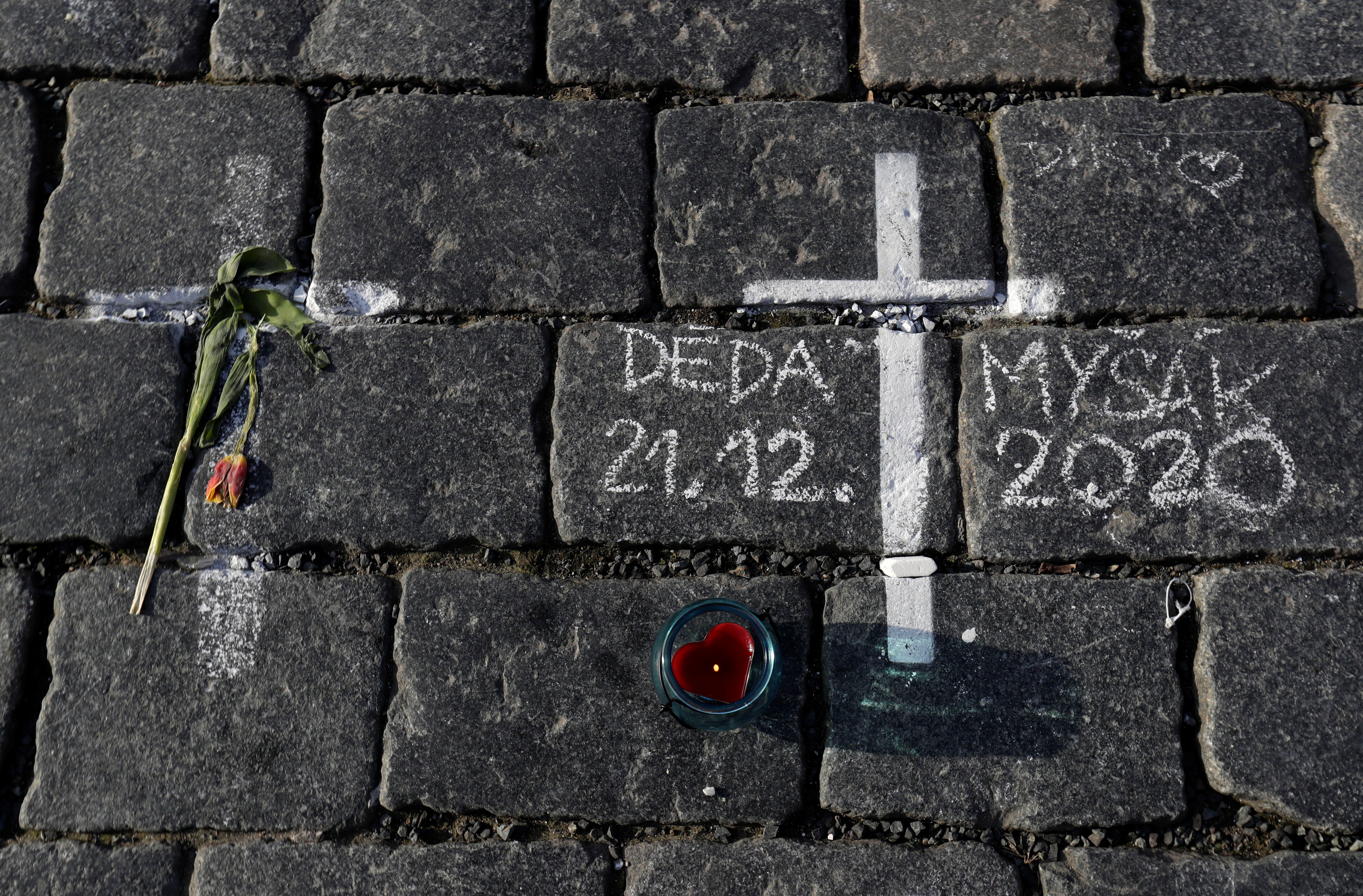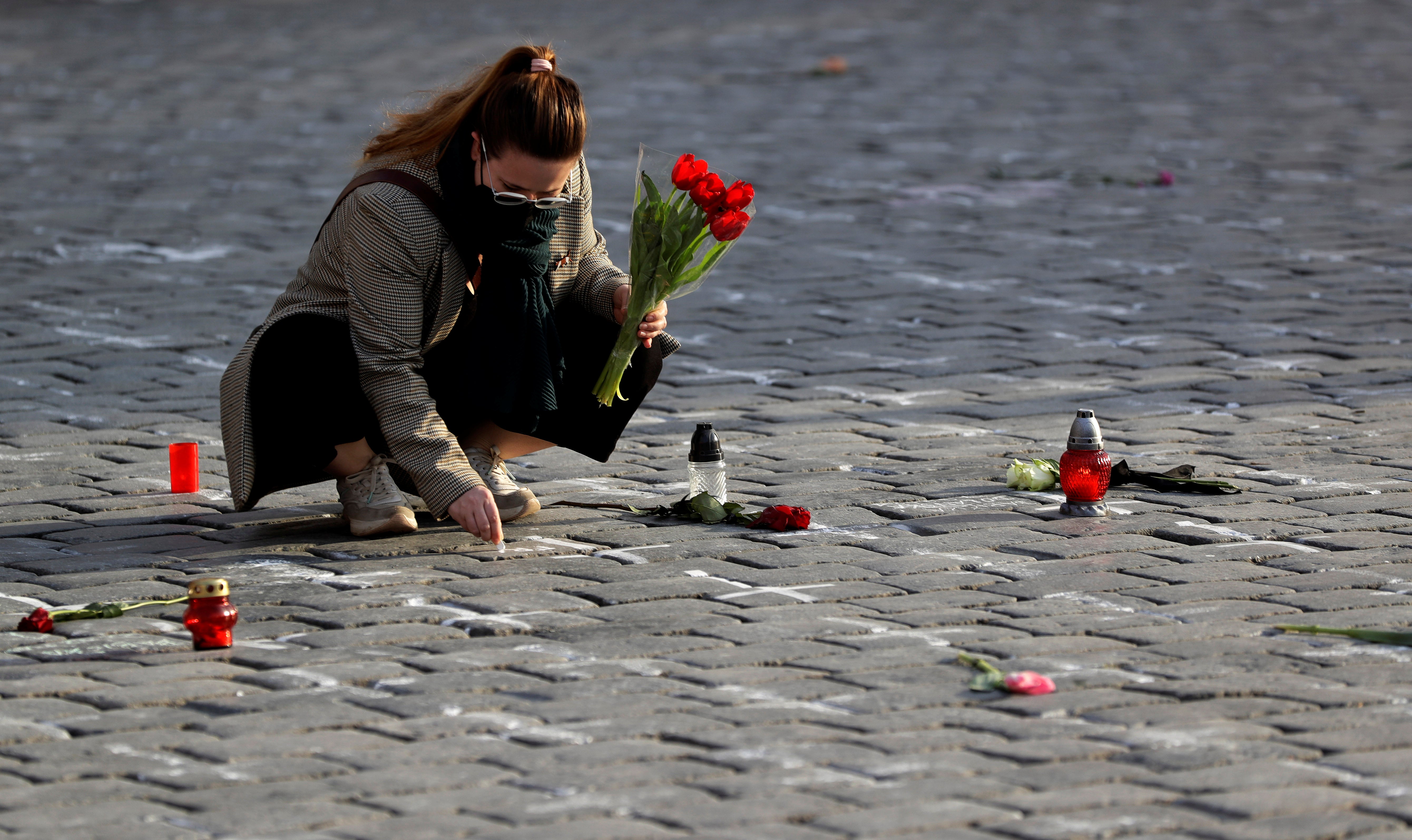The EU country that is not angry with Brussels for vaccine rollout
The Czechs have gone from being one of the least-affected nations by the pandemic, to one of its worst, reports William Nattrass in Prague

Over 24,000 white crosses were marked on Prague’s Old Town Square this week to commemorate the victims of Covid-19 in the Czech Republic.
The country has gone from being one of Europe’s least-affected nations following the first wave a year ago, to one of its worst affected today.
Having lived under lockdown measures since October, Czechs still do not have the comfort of a “roadmap” back to normal life, and cases and deaths remain stubbornly high.
Given frustration over slow vaccine rollouts throughout the EU, it might be assumed that the Czech Republic’s dire numbers – and seemingly never-ending lockdown – would make Czechs feel especially discouraged by Brussels’ failures in vaccine procurement.
Indeed, Czechs are looking on as their ‘Visegrad Four’ ally Hungary races ahead in the EU vaccination tables, having independently approved four Eastern jabs (Sputnik V from Russia, Sinopharm and CanSino from China, and Covishield from India).
Read more:
Neighbouring Slovakia has also lost patience with the EU’s procurement programme – a first batch of Sputnik V vaccines arrived in the country at the start of March.
But rather than being attributed to EU failure, though, the Czech Republic’s vaccine situation is widely perceived as the latest chapter in a litany of failures by Prime Minister Andrej Babis’s government.
Many believe the government’s actions since the resurgence of Covid in the autumn have been too slow to be effective. Now, restrictions are only getting tighter.
At the end of February, movement between municipalities was forbidden for the first time since the start of the pandemic. With the government looking at extending its state of emergency until mid-April, a plan to compensate hospitals and healthcare providers for cancelled operations risks bankrupting health insurance companies.
An investigation by the Czech Republic’s Supreme Audit Office this week presented a scathing picture of the government’s handling of the crisis.
It found that the Ministry of Health had “significantly, and for a long time, underestimated the preparation needed for the Czech healthcare system to cope with an epidemic”, describing the government’s actions during the pandemic as “chaotic”.

“The worst aspect of the government’s response has been bad communication, which has actually turned many people against restrictions,” says Benjamin Roll, chair of the major anti-Babis campaigning organisation Million Moments for Democracy, responsible for the painting of white crosses in Prague’s Old Town Square this week.
“Measures have been chaotic, and the government’s unwillingness to listen to experts has been an ongoing problem. The current restrictions are tough – but they don’t seem to be effective. This has made a lot of people lose faith in the government.”
Indeed, the latest Covid-19 figures in the Czech Republic make grim reading.
The number of people currently infected with Covid-19 reached new heights of around 150,000 in the last two weeks, and the percentage of tests coming back positive has been stuck at approximately 30 per cent since January.
Recent days have seen more Covid patients in hospital and intensive care than ever before (9,000 and 2,000 respectively), while at the current death rate, March will be the deadliest month of the pandemic so far.
In this environment, it is perhaps unsurprising that blame for the nation’s slow vaccine programme is also being placed on the government. For Czechs, EU failure in purchasing vaccines is something intangible and abstract, but the failures of the national government are seen and felt every day.
In January, Jan Blatny, the health minister, said that the Czech Republic would be vaccinating around 100,000 people per day by March – in reality, the highest daily figure so far this month has been 52,000.
Earlier this month, the government promised 100,000 doses per day in April – but vaccination rates are now predicted to decline due to supply issues.
It has been claimed that hundreds of thousands of vaccine doses have been allowed to sit unused, and it recently emerged that the Czech government failed to secure as many vaccines as were available through the EU’s procurement programme, ordering only 81 per cent of the offered supplies.
For many, insufficient supply from the EU has been the least of the country’s problems.
“We now have a problem with vaccination, because the government acquired less vaccines than were available – despite the prime minister blaming the slow rollout on the EU,” claims Roll.
With elections approaching in October, Czechs will soon have the chance to make their displeasure known. Polls show the opposition in the lead, and surveys suggest only a third of Czechs have any faith in the ruling coalition. An opposition united in antipathy towards Babis, the nation’s fourth wealthiest person and owner of some of its most influential newspapers, smells blood.
At the same time, large sections of the Czech population seem to have more trust and confidence in the EU than in their own leaders. Taking the independent “Hungarian way” on vaccine procurement is not widely popular. The geopolitical implications of such a move – essentially declaring Brussels’ vaccine strategy a failure – are seen by many as too risky.
“The Czech Republic, as an EU member state, should not use vaccines that have not been registered with the European Commission,” declared Pavel Sindelar, from the opposition ODS party.
Martin Kolovratnik, from the ruling ANO party, meanwhile claims the Czech Republic is “an integral part of the EU, and [the EU] should act in unison”.

Neighbouring Slovakia provides a cautionary example of the potential political difficulties,with disputes about the procurement of Sputnik V leading the country’s government to the brink of collapse.
Two Slovak coalition parties expressed outrage at the decision to side with Hungary against EU vaccine policy, resulting in a wave of resignations and the likely departure of Igor Matovic, the prime minister.
Many Czech epidemiologists and health authorities – including health minister Blatny – believe departing from EU vaccine procurement would pose health risks as well as political ones.
When this loyalty was recently tested in a dispute over the use of the drug Ivermectin for treating Covid patients, the Health Ministry sided with the European Medicines Agency in restricting its use to experimental treatments.
Leading Czech virologist Libor Grubhoffer summed up the hesitation about using non-EMA-approved vaccines like Sputnik V: “I do not trust the way the vaccine is made,” he said in February.
“I do not trust the Russian authorities, who have been able to bring the vaccine into widespread use without passing preclinical and clinical trials to the necessary extent. This is great irresponsibility, in my opinion.”
Given the relatively high levels of vaccine scepticism in the Czech Republic, it may come as a surprise that Czechs did not engage in recent European flip-flopping over the safety of the AstraZeneca jab. In reality, the lack of a knee-jerk response confirmed the country’s faith in the EMA, regardless of concerns from individual European health bodies.
Many Czechs still believe strongly in the EU and its regulatory processes. When it comes to political responsibility, though, the pandemic has put the Czech national government front and centre. Czechs are far more likely to place the blame for a lack of vaccines – and the virus situation as a whole – on their own representatives, rather than EU leaders.
Join our commenting forum
Join thought-provoking conversations, follow other Independent readers and see their replies
0Comments